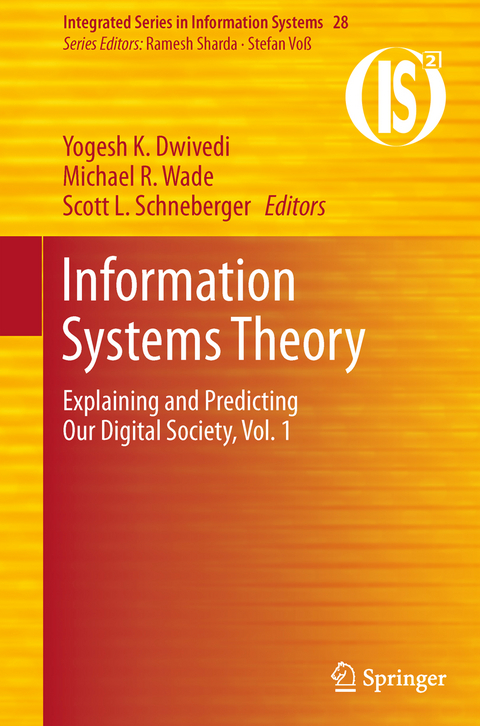
Information Systems Theory
Springer-Verlag New York Inc.
978-1-4614-3011-7 (ISBN)
The overall mission of this book is to provide a comprehensive understanding and coverage of the various theories and models used in IS research. Specifically, it aims to focus on the following key objectives:
To describe the various theories and models applicable to studying IS/IT management issues.
To outline and describe, for each of the various theories and models, independent and dependent constructs, reference discipline/originating area, originating author(s), seminal articles, level of analysis (i.e. firm, individual, industry) and links with other theories.
To provide a critical review/meta-analysis of IS/IT management articles that have used a particular theory/model.
To discuss how a theory can be used to better understand how information systems can be effectively deployed in today’s digital world.
This book contributes to our understanding of a number of theories and models. The theoretical contribution of this book is that it analyzes and synthesizes the relevant literature in order to enhance knowledge of IS theories and models from various perspectives. To cater to the information needs of a diverse spectrum of readers, this book is structured into two volumes, with each volume further broken down into two sections.
The first section of Volume 1 presents detailed descriptions of a set of theories centered around the IS lifecycle, including the Success Model, Technology Acceptance Model, User Resistance Theories, and four others. The second section of Volume 1 contains strategic and economic theories, including a Resource-Based View, Theory of Slack Resources, PortfolioTheory, Discrepancy Theory Models, and eleven others.
The first section of Volume 2 concerns socio-psychological theories. These include Personal Construct Theory, Psychological Ownership, Transactive Memory, Language-Action Approach, and nine others. The second section of Volume 2 deals with methodological theories, including Critical Realism, Grounded Theory, Narrative Inquiry, Work System Method, and four others.
Together, these theories provide a rich tapestry of knowledge around the use of theory in IS research. Since most of these theories are from contributing disciplines, they provide a window into the world of external thought leadership.
The Updated DeLone and McLean Model of Information Systems Success.- If They Build It, Will They Come? The Technology Acceptance Model.- A Bibliometric Analysis of Articles Citing the Unified Theory of Acceptance and Use of Technology.- Why do People Reject Technologies: A Review of User Resistance Theories.- Task-Technology Fit Theory: A Survey and Synopsis of the Literature.- Migrating Processes from Physical to Virtual Environments: Process Virtualization Theory.- The Theory of Deferred Action: Purposive Design as Deferred Systems for Emergent Orgaisations.- Resource-based View Theory.- On the Business Value of Information Technology: A Theory of Slack Resources.- Portfolio Theory: The Contribution of Markowitz's Theory to Information System Area.- The Theory of the Lemon Markets in IS Research.- The Technology: Organization - Environment Framework.- Contingency Theory in Information Systems Research.- IT and Porter's Competitive Forces Model and Strategies.- Information Technology and Organisational Performance: Reviewing the Business Value of IT Literature.- Applying "Business Case" Construct Using the "Diffusion of Innovations" Theory Framework: Empirical Case Study in the Higher Edcuation.- Punctuated Equilibrium Theory in IS Research.- Discrepancy Theory Models of Satisfaction in is Research.- Institutional Change and Green IS: Towards Problem-driven, Mechanism-based Explanations.- A Multi-level Social Network Perspective on ICT Adoption.- Expectation Confirmation Theory in Information System Research: A Review and Analysis.- Stakeholder Theory & Applications in Information Systems.
| Reihe/Serie | Integrated Series in Information Systems ; 28 |
|---|---|
| Zusatzinfo | XXVI, 502 p. |
| Verlagsort | New York, NY |
| Sprache | englisch |
| Maße | 155 x 235 mm |
| Themenwelt | Mathematik / Informatik ► Informatik ► Datenbanken |
| Mathematik / Informatik ► Informatik ► Netzwerke | |
| Informatik ► Office Programme ► Outlook | |
| Mathematik / Informatik ► Informatik ► Web / Internet | |
| Mathematik / Informatik ► Mathematik ► Finanz- / Wirtschaftsmathematik | |
| Wirtschaft ► Allgemeines / Lexika | |
| Wirtschaft ► Betriebswirtschaft / Management | |
| ISBN-10 | 1-4614-3011-9 / 1461430119 |
| ISBN-13 | 978-1-4614-3011-7 / 9781461430117 |
| Zustand | Neuware |
| Haben Sie eine Frage zum Produkt? |
aus dem Bereich


